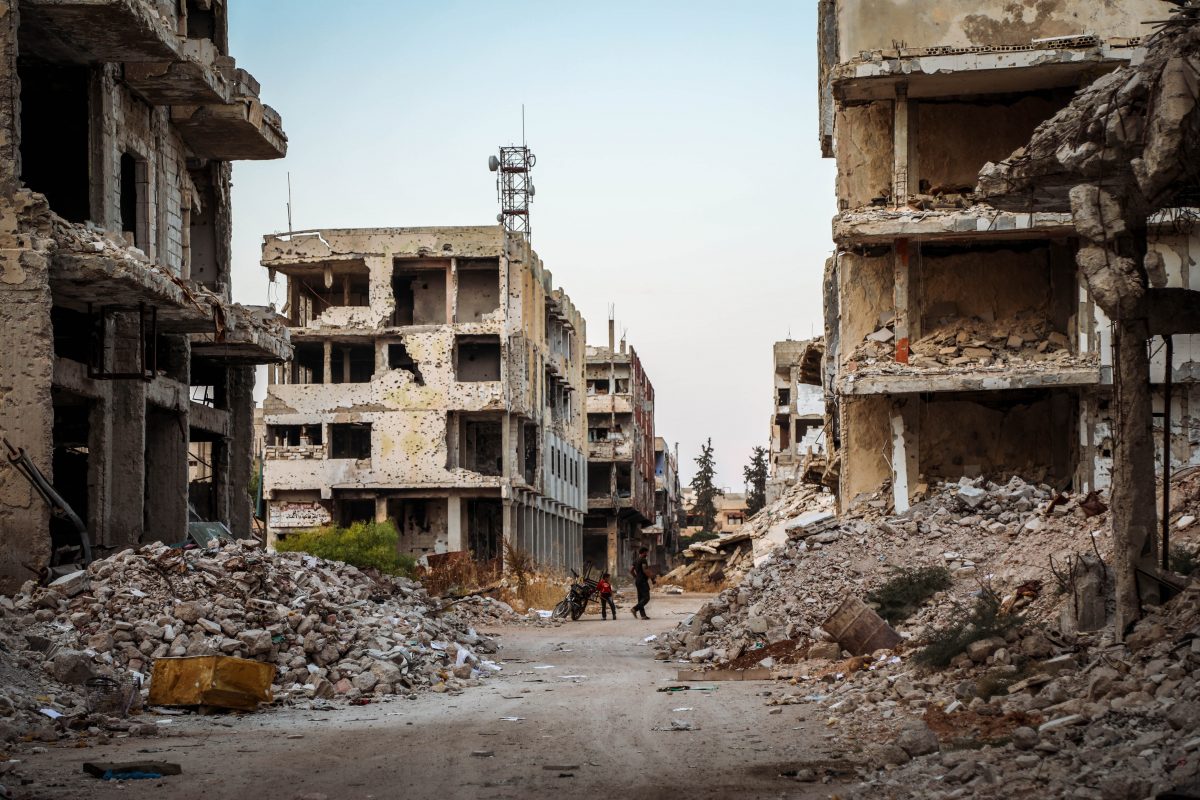An Unneighborly Gift in Times of Need
Are States Required to Admit Persons Displaced by the Impacts of the Recent Earthquakes?
In February 2023, the news of devastating deadly earthquakes in Türkiye and Syria shook the globe. The horrifying effects of these earthquakes led to a death toll that has surpassed 54.000 in both countries and to innumerable other injuries and damages. In response to these testing times, a wave of solidarity arose and various actors have provided support to the States or the population of the affected regions. In this context, Greece’s migration minister, Mitarachi, called for emergency aid to be sent to those in need. His call, however, was not as neighborly as one would instantly think.
Indeed, this call aimed at the prevention of mass migratory flows, which are expected due to the disastrous effects of the earthquakes, from reaching the Greek borders. In a recent interview, Mitarachi added that persons fleeing Ukraine are in a completely different situation to those displaced from earthquake-affected regions, and, thus, these persons do not have to be admitted to the Greek territory. Conversely, Mitarachi further pledged to implement plans to extend the fence at the Greek-Turkish border in Evros, while additional border patrols were deployed at the Greek frontiers with Türkiye to counter expectations of a surge in arrivals of people displaced by the recent earthquakes.
The purpose of the present blogpost is to answer the question of whether persons, whose displacement is linked to the recent earthquakes, and who claim that they may be subjected to mistreatment if they remain on the territory of another State, fall within the scope of the States’ obligation to admit protection-seekers in their territory. The blogpost will, thus, not engage with an in abstracto assessment of whether these persons are owed international protection but will focus on whether they fall within the personal scope of the said obligation.
The Obligation to Admit Protection-Seekers
An international obligation to admit protection-seekers seemed too controversial to certain scholars, who emphasized that States have a sovereign right to admit into their territory only those persons that they deem advisable (Boed, p. 5). However, this international obligation has nowadays found its way into both academic writings and jurisprudence. Precisely, provisions on non-refoulement and the prohibition of mass expulsions have been interpreted as requiring States to grant protection-seekers access to means of legal entry into their territories with the aim of providing them access to asylum procedures and assessing the risks faced upon their removal (FRA Report, p. 154; Graf and Katsoni, pp. 155-157).
As the European Court of Human Rights (ECtHR) has clarified, States cannot deny entry to their territory to protection-seekers presenting themselves at the border alleging that they may be subjected to mistreatment if they remain on the territory of another state, unless adequate measures are taken to eliminate such a risk (M.K. and others v Poland, para. 179). To eliminate such a risk, the ECtHR has found that the sending State would have to examine whether the individual at stake will have access to an adequate asylum procedure in the state of return upon non-admission (ibid, paras. 172-173), as well as whether safeguards against indirect refoulement and inhuman or degrading treatment exist in that State (M.S.S. v Belgium and Greece, paras. 344-365). Although the ECtHR interpreted in M.K. and others v Poland the prohibition of mass expulsions in particular, the obligation to admit have also been read as stemming from non-refoulement provisions and as covering the arrival of individual protection-seekers as well (Seid Mortesa Aemei v. Switzerland, para. 9.8; D. D. v. Spain, para 14.4; Kälin, Caroni and Heim, p. 1363; See also 32nd CPT Report, p. 29, para. 90 and p. 32 para 99).
Against this background, the question arises whether persons fleeing from places where they face risks exacerbated by the impacts of natural disasters fall within the personal scope of this obligation of admission, although these persons do not prima facie fall within the scope of the refugee definition (McAdam, p. 708). This seems to be the rationale behind Mitarachi’s distinction between persons fleeing conflicts and persons fleeing the impacts of the recent earthquakes. In other words, the question arising is whether the personal scope of the obligation to admit is so broad as to entail persons who may not fall within the scope of the refugee definition and whose protection claims may not turn out being successful.
The Personal Scope of the Obligation to Admit
A characteristic of the positive obligation to admit protection-seekers is the fact that it is deemed as a prerequisite for the fulfilment of the States’ obligation to grant access to asylum or risk assessment procedures (Salerno, p. 502; Report of the Inter-American Commission of Human Rights, para. 25). Thus, a potential negative outcome of such a procedure could be seen as a factor alleviating the State from its obligation to admit the protection-seeker at issue.
However, in this regard, it has been underlined that for States to ensure that they will not be removing someone to a place where there is a risk of persecution, inhuman or degrading treatment, they must grant protection-seekers a meaningful opportunity to raise their claims in a personalized interview by a fully qualified official in a place that respects their privacy (Dastyari and Ghezelbash, pp. 12-14). Throughout this process, they have to have access to free legal representation, interpretation and a review of the initial status determination or risk assessment by an independent tribunal or court (ibid). As has been noted, this obligation also covers accelerated procedures, which are frequently applied to claims appearing as manifestly unfounded or abusive in the context of ‘safe countries of origin’ or ‘safe third countries’ policies (Kälin, Caroni and Heim, pp. 1376, 1382-1387), and extends to situations of mass influx (Hirsi Jamaa and Others v Italy, paras 201-207; Sharifi and Others v Italy and Greece, paras 240-243).
The above requirements will seem rational if one considers that a decision of non-admission based on a prima facie assessment of the risk that the protection seekers face is neither compatible with the standards of international refugee law and human rights law nor capable of addressing the complexity of the risk assessment in cases of persons displaced from disaster affected regions. This is the case because the pre-existing risks, which are exacerbated on the occasion of a natural disaster, can only be assessed on a case-by-case basis and differ considerably from one person to another (Ioane Teitiota v New Zealand, paras. 8.4, 9.3; McAdam, pp. 712-713). In other words, persons displaced in the context of disasters may have valid claims for refugee status, for example, where the adverse effects of disasters interact with armed conflict, violence or other pre-existing risks, and their claims shall be thoroughly assessed by competent state authorities. The same holds true with regard to those displaced following the recent earthquakes. A recent report issued by Amnesty International has already warned about the impacts of these earthquakes on the human rights of displaced persons and the challenges faced by vulnerable groups. Practices employed by the States following the earthquakes (particularly of the limitations on the freedom of expression, and arbitrary detentions reported in the earthquake-struck States [Amnesty International Report, p. 5]), as well as torture and ill-treatment, imposed on persons detained for alleged looting following the earthquakes (ibid, p. 6), could exacerbate pre-existing risks, and could thus give rise to successful asylum claims. For this to be verified, a thorough assessment of the protection-seekers’ claims would have to be conducted.
It seems that a proper assessment of the above claims would require States to admit protection seekers fleeing earthquake affected regions, if they present themselves at their border seeking protection, and to grant them access to risk assessment procedures. The non-admission of such protection-seekers will be only compatible with non-refoulement and the prohibition of mass expulsions, if there are guarantees that their applications will be seriously examined by the authorities of a third State and if remaining in that third State would not mean that the individuals at stake would be subjected to persecution, torture, inhuman or degrading treatment (M.K. and others v Poland, paras 172-173, 178), or indirect refoulement (M.S.S. v Belgium and Greece, paras. 344-365). This exception presupposes that a third State will grant access to such procedures (Mole, p. 29) and that the State denying to grant access to procedures has assessed the circumstances in that third State (Ilias and Ahmed v Hungary, paras 124-141). Under these conditions, denial of access to procedures will be lawful (FRA Report, p. 8).
Concluding Remarks
As the analysis above evinces, persons displaced from regions that have been struck by disasters are entitled to the same protection as any other protection seekers when it comes to the positive obligation to admit. This is the case because a meaningful assessment of their protection claims requires a risk assessment procedure that meets the standards set by international refugee and human rights law; a prima facie assessment of the risk does not suffice. Against this background, this justification employed by politicians differentiating between persons fleeing Ukraine and persons displaced from earthquake affected regions is nothing but another legalistic justification employed by States for the justification of selective and discriminatory admissions.
The “Bofaxe” series appears as part of a collaboration between the IFHV and Völkerrechtsblog.

